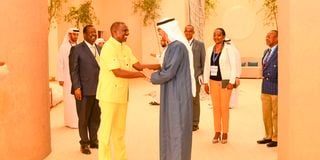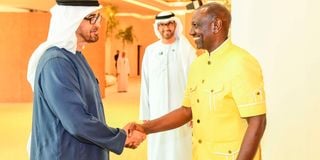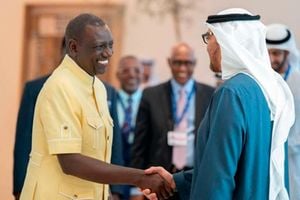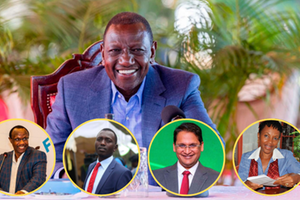
President William Ruto with President Sheikh Mohamed bin Zayed Al Nahyan of the United Arab Emirates and the ruler of Abu Dhabi at Expo City Dubai.
At 9.07am on Sunday, September 26, President William Ruto’s economic adviser David Ndii posted a story on his X handle announcing an cash injection by Abu Dhabi’s International Holdings Company (IHC) into Adani Group, the Indian conglomerate behind controversial proposals to take over key national assets, including the JKIA.
Dr Ndii did not make any further comment on his post, which came after revelations that his wife, Mwende Gatabaki, was shareholder in one of the companies that have been awarded a contract to implement the Universal Healthcare IT system at a cost of Sh104 billion.
The post, however, put a controversial Emirati royal at the centre of the Sh485 billion deals that India’s Adani Group is angling for in different sectors of Kenya’s economy under President Ruto’s administration.
Tahnoon bin Zayed Al Nahyan also known as ‘the spy Sheikh’, is the son of Zayed bin Sultan Al Nahyan, the founder of the UAE, and majority shareholder and chairman of IHC.
Tahnoon’s brother, Khaled bin Mohamed bin Zayed Al Nahyan, is the United Arab Emirates Crown Prince. More specifically, his brother is the UAE ruler.
Tahnoon is the deputy ruler of Abu Dhabi, capital city of the UAE, and also his brother’s national security advisor.
The latter role earned him the moniker spy Sheikh, as Tahnoon has for years ruthlessly cracked down on alternative voices in and outside the UAE, waging cyberwarfare against anyone that dares speak against his brother’s regime.
But for Kenyans, Tahnoon is now one of the silent architects of three controversial deals which, if signed and implemented, could impact the lives of over 50 million people for the next three decades in the health, transport and energy sectors.
The government has for months secretly negotiated with foreign firms the contracts worth Sh485 billion. IHC is a public joint stock company registered in the UAE.
Tahnoon owns 61.1 per cent of IHC through his PAL Group of Companies. He serves as the chairman of the IHC board of directors.
IHC is the common denominator in all three deals with the Kenya Airports Authority, Social Health Authority and Kenya Electricity Transmission Company that have raised controversy on account of the secretive nature of their negotiation, and the involvement of some of their key shareholders in past financial scandals.
The UAE royal will, by virtue of his close links to the Adani Group, get a slice of the billions expected from the three controversial deals.
In 2021, Kenya was among several others that implanted partial economic shutdowns to counter the Covid-19 virus.
Dinlas Pharma, a local firm owed by health sector entrepreneur Jayesh Saini, got a license to administer the controversial Russian Covid-19 vaccine, dubbed Sputnik V.
A few weeks later, Russia’s Moscow Times revealed that the Emirati royal family had secured a deal to distribute the vaccine across the world.
The publication’s investigation indicated that the batch Mr Saini had brought in was delivered from the UAE.
The Russian government denied supplying the product in Kenya, raising questions as to where Mr Saini’s Dinlas Pharma sourced the vaccine from.
Kenya later revoked approvals that had been given to Dinlas Pharma to import the vaccine.
Three years later, the Emirati royal is entangled in a controversial deal that has links to Mr Saini.
Last week, Safaricom announced that it had secured a contract as part of a consortium with Apeiro Limited and Konvergenz Network Solutions to develop an Integrated Healthcare Technology System for the government’s planned Universal Healthcare Coverage, for Sh104.8 billion.
Rufus Marundu Maina, a director in companies associated with Mr Saini, is holding similar positions in two companies incorporated by Apeiro for the Sh104.8 billion deal.
Mr Maina is a director in Apeiro Kenya Technologies Ltd and SIH Africa Ltd.
Ms Gatabaki is an IT professional and wife of Dr Ndii, one of President Ruto’s trusted economic advisors.
SIH Africa owns all 1,000 shares in Apeiro Kenya Technologies Ltd.
The two are subsidiaries of Abu Dhabi-based investment firm, Sirius International Holding. Sirius is a subsidiary of IHC, and were both incorporated on July 5, 2024.
Apeiro Kenya Technologies Ltd’s directors, without any shares, are Mr Maina, Inder Deep Singh Virdi, Judy Mwende Gatabaki, and Aswanth Bindhu Lambodaran.

President William Ruto shakes hand with President Sheikh Mohamed bin Zayed Al Nahyan of the United Arab Emirates.
At SIH, Mr Lambodran and Nishant Mishra own 500 shares each, in trust. Mr Maina is a director in the company, but with no shares.
Members of Parliament (MPs) have already advised Attroney-General Dorcas Oduor not to approve the Sh104.8 billion deal. The National Assembly’s Departmental Committee on Wednesday criticised the deal revealing that the IHITS failed during tests early this week.
“They have tested the system in Marsabit and Tharaka Nithi counties and it failed. It is unclear why the Ministry (of Health) is insistent on replacing a working system,” posed Endebess MP Robert Pukose.
IHC also owns a five per cent stake in Adani Enterprises Ltd, the entity behind the proposed $2 billion (Sh257 billion) lease of the Jomo Kenyatta International Airport.
In July, Kisii Senator Richard Onyonka blew the whistle on plans by the Kenya Airports Authority (KAA) to lease the aerodrome (JKIA) to Adani Group 30 years.
The Indian conglomerate sent a Privately Initiated Project proposal to the KAA through another subsidiary, Adani Airports Holdings. The subsidiary is owned by Adani Enterprises Ltd.
IHC owns over five per cent of Adani Enterprises Ltd, after a further share purchase deal in September, 2023.
In 2022, IHC invested $2billion (Sh257 billion) in three companies under the Adani Group, founded by Indian billionaire Gautam Adani.
The investment gave IHC a minority, but lucrative, stake in Adani Enterprises Ltd, Adani Green Energy and Adani Energy Solutions.
One year later, IHC sold its stocks in Adani Green Energy and Adani Energy Solutions. But the Abu Dhabi firm increased its stake in Adani Enterprises Ltd, and now owns over five per cent of the firm.
In a statement, IHC attributed its investment in Adani Enterprises Ltd to the firm’s ability to scale up operations in airports and other facilities it has leased.
Prolonged public outcry forced a National Assembly investigation, which revealed that Adani Group had sent a Privately Initiated Project proposal to the KAA, in which it promised to do refurbishments and expansions worth $2 billion (Sh257 billion) during the concession period.
If the deal sails through, Adani will recoup its investment, and profit, in the 30-year period. The KAA is yet to clarify exactly how much Kenya will earn under the proposal.
As more details of the JKIA leasing plan were slowly coming to light, it emerged that the Kenya Electricity Transmission Company (KETRACO) was also in talks with another Adani firm, exploring a Sh95 billion deal.
Through Adani Energy Solutions, the conglomerate had proposed putting up electricity transmission lines and a substation for Sh95 billion. It would recoup Sh635 billion – more than six times its investment – over the 30-year concession period.
IHC also intends to pursue minerals in Kenya as part of a $1 billion (Sh129 billion) investment in mineral projects across Africa, the Financial Times reported in May.

President William Ruto with President Sheikh Mohamed bin Zayed Al Nahyan of the United Arab Emirates alongside Prime Cabinet Secretary Musalia Mudavadi.
In April, President Ruto met UAE’s Minister for Investment Mohamed Alsuwaidi at State House. They discussed a financing and investment framework through which the two countries would explore programme and investment opportunities worth $500 million (Sh64.5 billion).
The UHC deal has stoked controversy due to the involvement of individuals with close links to President Ruto, both directly or through their family members. President Ruto’s longtime friend, Adil Khawaja, who is the managing partner at Dentons, Hamilton, Harrison & Mathews, acted on behalf of Konvergenz in the deal.
In May, following a historic State visit to the US, President Ruto came under intense pressure over his frequent foreign travels that gobble billions of taxpayers’ money each year.
But to assuage the public, the President, during a televised national prayer breakfast in Nairobi, revealed that not all his trips are funded by taxpayers and that some, in particular the US trip, was funded by his “friends”.
Indeed, the US trip was funded by the United Arab Emirates (UAE) government, with taxpayers incurring less than Sh10 million, State House would later reveal in a statement.
Since President Ruto took office two years ago, Kenya and the UAE are forging closer business ties.
For instance, two UAE State-owned companies – Abu Dhabi National Oil Company (ADNOC) and Emirates National Oil Company Group (ENOC) – are supplying fuel to Kenya under the controversial government-to-government deal.









